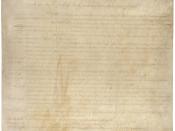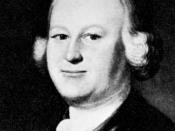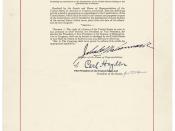The Forth Amendment � PAGE \* MERGEFORMAT �14�
The Fourth Amendment
and the application of the Exclusionary Rule
Samantha L. Diaz, Alexis Smith, Jose Ramirez, & Geini Nova
Professor La Nina Floyd-Cooke
CRJ 101.24
After the people endured the historically evil practices employed by the British prior to the American Revolution, and fought for our independence which enabled us to secure our fundamental rights, why should we today be subjected to arbitrary law enforcement procedures? We have the right to challenge the constitutionality of arrests and the seizure of evidence. Pursuant to the Exclusionary Rule, evidence seized in violation of the Fourth Amendment should be lawfully challenged and suppressed. There is no lawful excuse as to the admissibility of evidence obtained in violation of our constitutional safeguards. The Fourth Amendment to the United States Constitution states:
The right of the people to be secure in their persons, houses, papers and effects against unreasonable searches and seizures, shall not be violated and no warrant shall issue but upon probable cause supported by oath or affirmation specifically describing the place or persons to be searched and the things to be seized.
I find it profoundly important to discuss the historical relevance of the Fourth Amendment and some cases where the constitutionalities of arrests have been challenged, and the seizure of evidence has been suppressed. When an arrest is made in violation of the Fourth Amendment and evidence is seized pursuant to an unlawful arrest, the attorney representing the defendant can file a motion to suppress what is referred to as "the fruits of an unlawful arrest."
The historical evil behind the incorporation of the Fourth Amendment to the Bill of Rights originated back when the United States was under the control of the British. According to Kanovitz (1998), "general warrants and writs...


